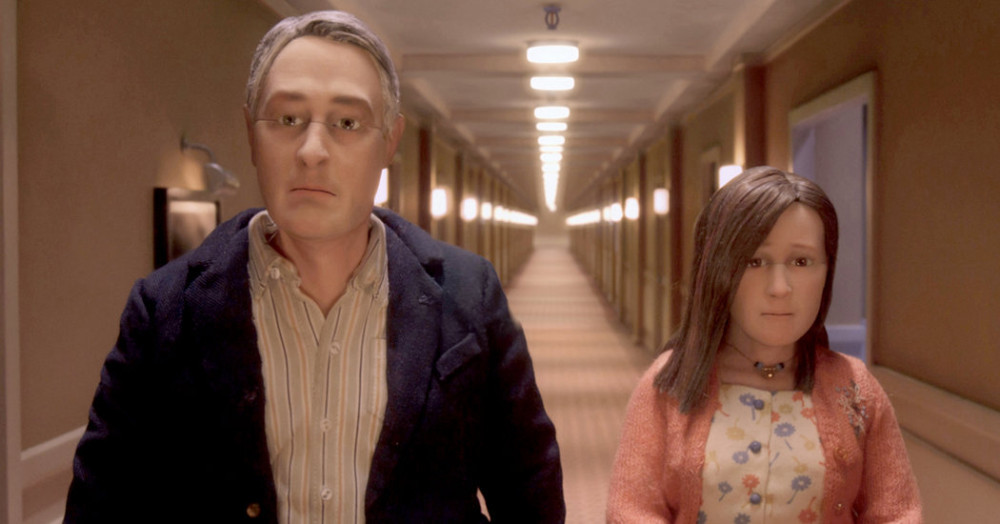
At this point in time, “male mid-life crisis” has practically become a subgenre of its very own. The amount of films each year released on that subject is baffling, and often it grows tiresome to see these protagonists go through the motions again and again. But, on occasion, a surprise shows up out of the blue. And, after years of patiently waiting, a Kickstarter-funded film by Charlie Kaufman and Duke Johnson shows there are ways to approach the subgenre of sorts that proves worthwhile and, dare I say it, more emotionally compelling than most films this year.
Anomalisa‘s main plot is simple enough: Michael is a motivational speaker who doesn’t seem to have an ounce of motivation left in his life. Voiced by David Thewlis, he sounds tired at the sheer concept of everything from getting a martini to attending another seminar. To make matters worse, every single person in his life—be it the bellboy, the taxi driver, his wife, or his child—sound exactly the same. It’s unfathomable to imagine existing in a world where everyone around you is voiced by Tom Noonan, whose voice acting here is both revelatory and horrifying in the way he manages to maintain his monotone voice while changing pitch and delivery for different characters.
It isn’t until Michael hears an angelic voice, that of Jennifer Jason Leigh’s Lisa, that things change for him. Again, it’s typical for mid-life crisis films to engage in telling the story of a man who meets a woman and finds happiness in her. But there’s something different, and tender, about their chemistry when compared to other, often predatory, films of this nature. You could easily say Lisa is an anomaly—Anomalisa, get it?—as Michael does as their casual conversation develops into something more: maybe, just maybe, it’s love, or at least a brief respite from the voices that surround him.
While watching Anomalisa, one can feel the ticks and beats of other Kaufman works inspiring a tale that’s, arguably, rather small-scale, especially when compared to his masterpiece Synecdoche, New York. It’s an incredibly intimate film, of the same scale and restrained emotion as David Lean’s Brief Encounter, though the catch here is that it’s all done with stop-motion animation. It’s here where Duke Johnson’s talent with stop-motion comes into play. Produced by Dino Stamatopoulos’ Starburns Industries (which most folks would identify with Community and Rick and Morty), there’s something about the animation here that’s more fascinating than your typical film of the type made for younger audiences (not to say that adult content inherently makes a film better than one for kids or teens).
The beauty is in the small details more than the grand-scale picture here, though that’s not to say that the sets Johnson & Kaufman create within the Fregoli Hotel aren’t as beautiful, and sometimes haunting, as anything else here, with one rather far-out and self-aware sequence proving to be right in Kaufman’s comfort zone. Where other stop-motion works won’t take even a mere moment to breathe, Anomalisa allows for nearly an entire minute dedicated to a man walking down a hallway to get ice to pour himself a drink. The magic is also in the wrinkles in Michael’s clothes, that move with him as he moves and breathes, and in the way that it captures every character habit and mannerism in the same way that the camera would if it was a live-action film. Better yet, the camera glides through rooms as situations happen with the utmost confidence, never cutting away unless necessary and allowing for heaven knows how many facial shifts in their characters; a painfully meticulous process for those creating, positioning and shooting each model and frame.
The intimacy of the narrative goes perfectly with the fine-tuned nature of the animation, with Kaufman’s dialogue for these characters being as melancholy and, occasionally, amusing as ever. The romance between Lisa and Michael is as tenderly composed as the one witnessed in Eternal Sunshine of the Spotless Mind; the kind of writing that makes us want to ignore the damning evidence against love blossoming between two damaged individuals (one of which is arguably an awful individual poised to seem charming). Add to that a sex scene between animated figures that arguably qualifies as more amorous than most live-action works, with all the laughter, awkwardness, and warmth that makes a first encounter feel genuine, even in the face of a manufactured filmmaking style.
But simply praising the filmmakers and their actors would be a crime, as one other individual—who co-created the original Anomalisa sound play with Kaufman—also delivers some of his best work this year: composer Carter Burwell. His musical accompaniment for the film is never intrusive, often utilizing the same motifs in different pieces to place emphasis on the monotony of the universe when Lisa is not within it. So necessary to the film is his music that, even when the film is having trouble hitting a perfect landing with its last few scenes (though the finale is arguably only as unsatisfactory as life is for Michael himself), the original song Kaufman and Burwell made for the film—which Tom Noonan sings with nearly the same drone as all of his characters—serves as a perfect, weirdly optimistic tune, to close a film that ends on a note that’s more bitter than sweet.
—
Directed by Duke Johnson and Charlie Kaufman; written by Charlie Kaufman; starring David Thewlis, Jennifer Jason Leigh, and Tom Noonan; 90 minutes.
Anomalisa is currently experiencing a limited theatrical release. In Miami, it opens at O Cinema on February 5th.



 Derek
Derek
 Isabelle
Isabelle